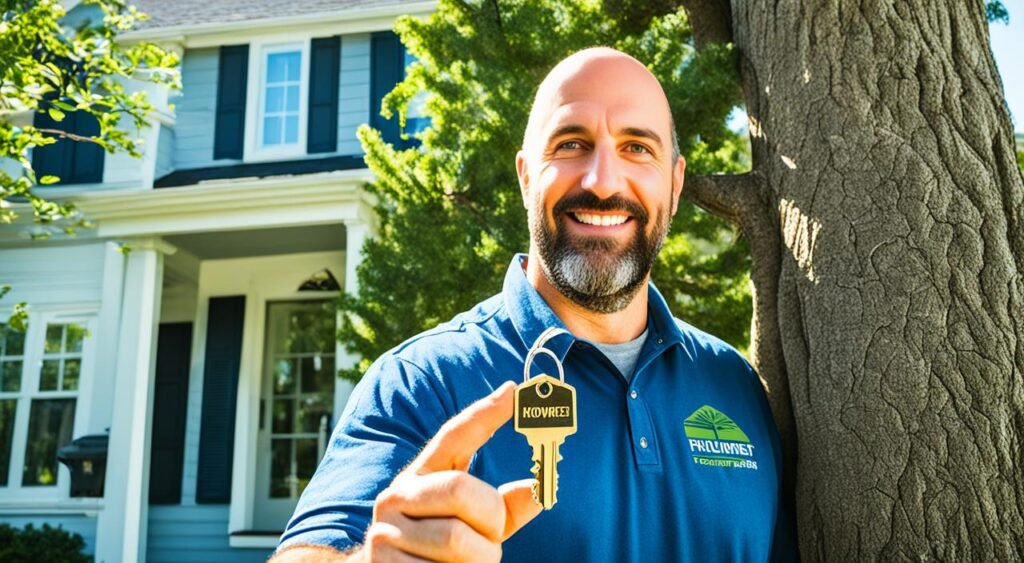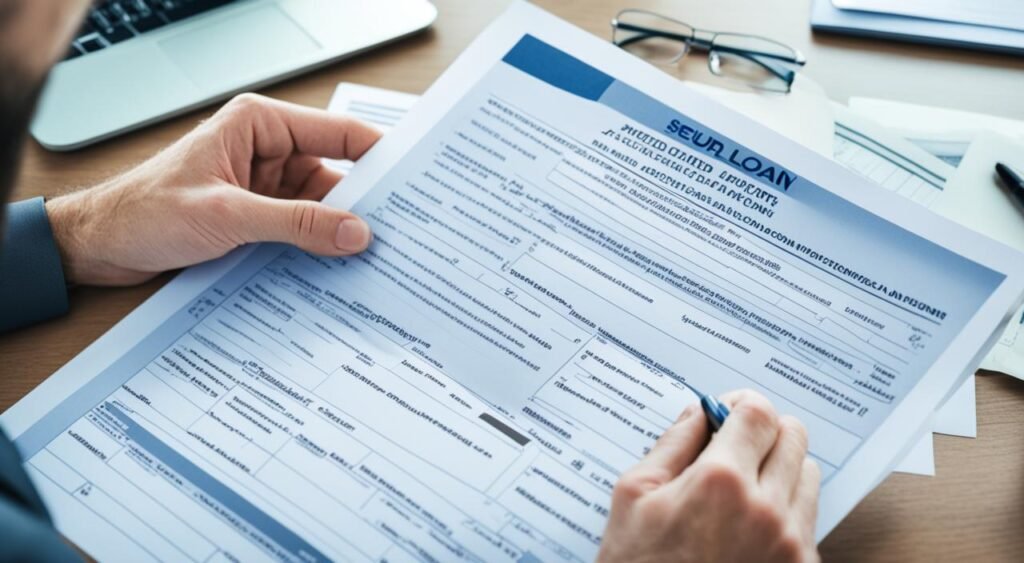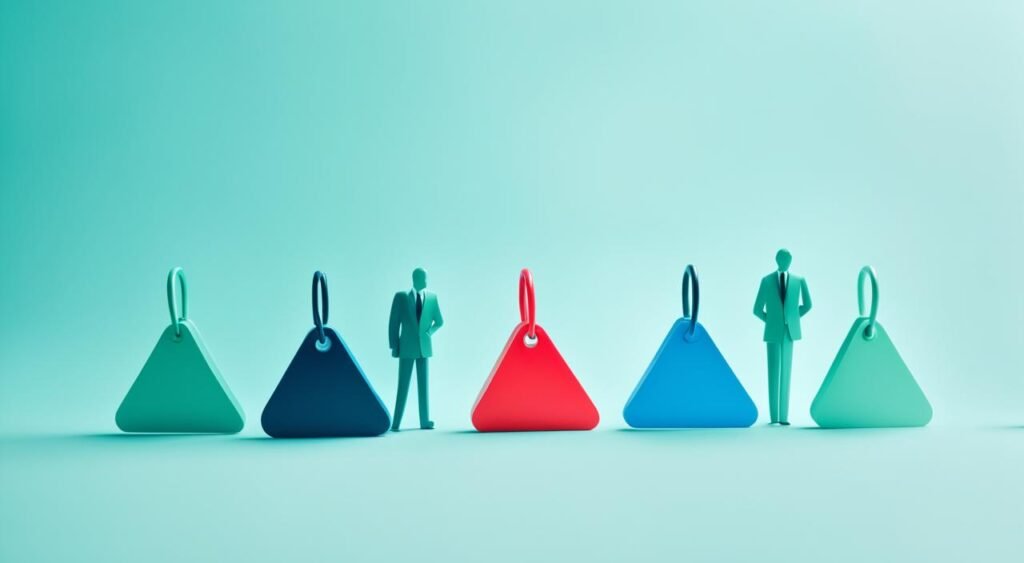Secured loans involve using your house or car as a guarantee. This can lead to lower interest rates and larger loan amounts. But, there’s a risk. If you don’t pay, you might lose your asset. We will explore secured loans, offering tips to help you decide wisely.
Key Takeaways
- Secured loans offer lower interest rates and higher loan amounts compared to unsecured loans.
- Collateral, such as a home or vehicle, is used to secure the loan, providing lenders with added protection.
- Borrowers risk losing their collateral if they default on the loan payments.
- Understanding the types of collateral and the application process is essential for securing a successful secured loan.
- Careful budgeting and maintaining good credit are crucial for managing a secured loan effectively.
Understanding Secured Loans
A secured loan works in a special way when you need to borrow money. In simple terms, a secured loan makes a borrower give something valuable, called collateral, to the lender. This is to ensure that the loan will be paid back on time. If not, the lender can take the item of value.
What is a Secured Loan?
A secured loan is when you offer something valuable, like a house or car, to get a loan. If you can’t pay back the loan, the lender can take your item. Because there’s less risk for the lender, they usually charge less interest and can offer more money. It’s good for people who have big items they can use as a guarantee.
Types of Collateral for Secured Loans
There are many kinds of collateral you could use in a secured loan. Here are some common examples:
- Real estate (e.g., a home or investment property)
- Vehicles (e.g., cars, trucks, or recreational vehicles)
- Savings accounts or investments (e.g., stocks, bonds, or retirement accounts)
- Other valuable assets (e.g., jewelry, art, or collectibles)
The collateral’s worth is key in deciding your loan amount and interest rate. Lenders check how much the collateral is worth now. They base the loan’s conditions on this value.
“Secured loans offer borrowers the opportunity to access larger loan amounts and lower interest rates, but the risk of losing the collateral is a significant trade-off to consider.”
Benefits of Secured Loans

Secured loans offer benefits that many find attractive. They come with lower interest rates and allow for higher loan amounts compared to unsecured loans.
Lower Interest Rates
Lower interest rates are a major plus of secured loans. The lender has the security of collateral if the borrower defaults. Thus, borrowers often enjoy better terms, with lower interest rates than unsecured loans.
Higher Loan Amounts
With secured loans, borrowers can get more money. This is because the collateral reduces the lender’s risk. It’s useful for big projects or buying a home.
“Secured loans offer a unique blend of benefits, with lower interest rates and the ability to access higher loan amounts – making them a compelling choice for those in need of substantial financing.”
Secured loans help borrowers get lower interest rates and more money. This can make their financial plans easier to achieve.
Risks of Secured Loans
Secured loans bring many good things, but there are risks too. Borrowers face the danger of losing their collateral on a loan. This collateral might be something big, like a home or a car. If payments are missed, the lender can take this collateral away.
Potential Loss of Collateral
If the collateral is taken, it could hit the borrower’s finances hard. Imagine losing a house or car you worked hard to own. It’s important for borrowers to really think about if they can pay back the loan. This is because secured loans bring the risks of secured loans, like the potential loss of collateral. Also, the lender could take the collateral if needed.
It’s smart for borrowers to check their finances carefully. They should have a solid plan to make their loan payments. Not doing this could lead to losing their collateral. This would be a tough situation for anyone.
“Losing a valuable asset like a house or car can be financially devastating. Borrowers must carefully weigh the risks of secured loans before committing to one.”
So, while secured loans can be good because of lower rates and more money, there are serious downsides. The main ones are the potential loss of collateral and the chance of collateral seizure if you can’t keep up with payments. Thinking ahead and knowing your finances well before you sign up for a secured loan is key.
Qualifying for a Secured Loan
To get a secured loan, people need to put in more work. They must have something valuable to back the loan. This might include homes, cars, or savings. Lenders look at the value of this item and how financially responsible the borrower is. They check the person’s credit score, earnings, and debts.
Having a good credit score and valuable collateral helps a lot. If the item is worth a lot, they might get better loan terms. but, loans are usually only for 80-90% of the item’s worth. This protects the lender if the borrower can’t pay back the loan.
Secured Loan Requirements
To get a secured loan, you must have:
- Valuable Collateral: You need something like a house, car, or savings to secure the loan.
- Good Credit Score: A credit score of 680 or more is usually needed.
- Stable Income: Prove you have a steady income, from work or your own business.
- Low Debt-to-Income Ratio: It’s best if your monthly debts are less than 43% of your income.
Collateral Loan Eligibility
The thing you use for collateral can be different. But the lender needs to be able to figure out its value. They should also be able to take it back if you can’t pay. Here’s what might work:
- Places you live in or rent out
- Cars, trucks, or RVs
- Money in the bank or investments
- Expensive things, like jewelry
How valuable the item is and your financial situation decide if you get the loan. These choices also shape the loan’s conditions.
“Securing a loan with collateral can provide access to larger loan amounts and lower interest rates, but it’s important to carefully consider the risks involved.”
The Application Process

Applying for a secured loan means showing lenders detailed info about your collateral. You must prove you own the asset you’re putting up. This could be a title or deed. It’s also key to have the asset appraised to know its value.
Required Documentation
For a secured loan, you’ll need to provide a few documents:
- Proof of ownership for the collateral (e.g., title, deed)
- Appraisal or valuation of the collateral asset
- Personal financial statements (income, assets, liabilities)
- Employment and income verification documents
- Tax returns from the previous year
Credit Score Requirements
Don’t forget that your credit score matters a lot. Lenders will check your credit to decide if you get the loan. Secured loans can be easier to get if your credit score isn’t perfect. But, a better score can mean lower interest rates and easier approval.
| Credit Score Range | Approval Likelihood | Interest Rate |
|---|---|---|
| 700 and above | High | Lower |
| 640-699 | Moderate | Average |
| Below 640 | Lower | Higher |
Knowing what you need for a secured loan and how credit scores work is useful. It helps make your application stronger. This way, you could get better loan terms and increase your chances of getting the loan.
Secured Loan Repayment

Secured loans have different payback times. Some loans need payments for a few years, others for decades. It all depends on the loan kind and what you offered as security. It’s key to stick to your payment plan. If you hit a snag, talk to your lender fast.
Secured Loan Repayment Terms
The time to pay back a loan is set by how much you borrowed, your collateral’s value, and your credit score. Big loans like for homes can take 15 to 30 years to pay off. Smaller ones for cars or personal goods might just need 3 to 7 years.
Consequences of Defaulting on a Secured Loan
Miss your loan payments, and you could lose what you placed as collateral. This could hurt your credit score badly. Your lender can legally take your collateral and sell it if you don’t pay. That would be hard on you.
To stay out of trouble, think hard before getting a loan. Talk to your lender if you’re not sure about making all your payments. Being open and dealing with issues early on could save you a lot of trouble.
Secured Loans vs. Unsecured Loans

Choosing between a secured loan or an unsecured loan is a big decision in personal finance. The key difference is whether there is collateral or not. The choice between these loans impacts your financial future, making it crucial to know the details.
For a secured loan, you put something valuable like your home or car as a promise to pay back. This reduced risk for the lender can mean lower interest rates and you might be able to borrow more. On the flip side, unsecured loans don’t require you to risk your assets. They base their decision on how likely you are to pay them back.
Secured loans often offer lower interest and let you borrow more than unsecured loans. But if you can’t pay back, you could lose whatever you put up as collateral. Unsecured loans are riskier for the lender, so they usually cost more in interest. They also have stricter rules on who can get them. However, your personal assets are not on the line.
Before picking a loan, it’s smart to think about what you want and can handle. Secured loans work for those needing big amounts at lower rates. If you’re worried about losing what you love, unsecured loans might be better. They help you avoid the risk of losing your valuable assets.
| Secured Loans | Unsecured Loans |
|---|---|
| Require collateral (e.g., home, car) | Do not require collateral |
| Usually offer lower interest rates | Typically have higher interest rates |
| Allow for higher loan amounts | Offer lower loan amounts |
| Risk of losing collateral if defaulted | No risk of losing assets |
Picking the right loan depends on your own financial situation and comfort with risk. Knowing the benefits and downsides of each can guide your choice. It’s about finding what works best for your financial goals and safety.
Tips for Managing a Secured Loan
Understanding secured loans is like walking a tightrope. But, with the right moves, you can handle your loan well. This keeps your credit score healthy. The key is smart budgeting and constant credit checks.
Budgeting Strategies
Building a solid budget matters a lot for your secure loan. First, figure out your monthly payment. Make sure you always have the money for it. Here are some other budgeting tricks:
- Watch your spending closely. This helps you find places to save and put more towards your loan.
- Always put your loan first in your budget. It’s a must-pay bill.
- Look for ways to make extra money like a part-time job. This can help you pay off your loan faster.
Maintaining Good Credit
Keeping your credit score high is crucial. It affects your future loan options. To ensure a good score, remember these tips:
- Always pay your loan on time. Late payments hurt your credit.
- Check your credit report often to spot errors or fraud early.
- If you see money problems coming, talk to your lender. They might help you avoid serious issues.
Use these tips for a secured loan and budgeting strategies to manage well. Also, keep your credit score good. This way, you’ll take on the loan world without fear.
“Being careful with a secured loan can lead to better financial futures.”
Secured Loan Alternatives
Secured loans are a common way to get cash, but they’re not the only option. If you’re looking for something else, there are different choices. These can give you more freedom and often better deals, depending on what you need.
An unsecured personal loan is one choice. These loans don’t need any collateral. Yet, they usually have higher interest rates. This could be a good pick if you don’t have things to use as collateral. Or if you’re worried about losing what you put down.
Home equity loans or lines of credit are another route. These use your home as security, like secured loans do. But they might have lower interest rates. That makes them a swing for homeowners.
Credit cards or peer-to-peer lending are also out there. They’re not for everyone. But they could work if you can’t go for secured loans. Or if you prefer not to.
The right pick depends on you. It’s about your financial health and what you aim to do. Take the time to look and compare the choices. This helps you find what works best for you.
“Exploring alternatives to secured loans can open up new opportunities for borrowers and provide more flexibility in financing their goals.”
Also Read: Understanding Your Loan Eligibility Essentials
Conclusion
Secured loans can help people get more money or lower interest rates. Borrowers use something valuable as a guarantee. This makes getting a loan easier on their wallet. But if payments are missed, the item used as a guarantee can be taken away.
It’s smart to look at your money situation first. Understanding how to apply for these loans and what you must pay back is also key. Knowing your other loan options is important too.
Managing a secured loan well involves budgeting and keeping a good credit score. This can bring good long-term results. Secured loans offer good things like less interest and more money, but there’s also a risk. To decide if it’s right for you, look carefully at the good and bad sides.
FAQs
What is a secured loan?
A secured loan is a way to borrow money. The borrower puts up something they own as a promise to pay back the loan. This something is called collateral. It assures the lender they will get their money back.
What types of collateral can be used for secured loans?
There are several things you can use as collateral. Common choices are homes, cars, savings, and investment accounts.
What are the benefits of a secured loan?
Secured loans offer lower interest rates than unsecured loans. They can also allow you to borrow more. This happens because securing the loan with something you own lowers the lender’s risk.
What are the risks of a secured loan?
The main risk is losing the collateral if you can’t pay back the loan. If you miss payments and the loan defaults, the lender could take your collateral.
What are the requirements to qualify for a secured loan?
To get a secured loan, you must have something valuable to use as collateral. This could be a house, car, or investment account. Lenders also look at your credit score to see if you qualify.
What is the application process for a secured loan?
When you apply, you’ll need to provide proof of the collateral and your financial details. Your credit score is a big factor in the loan decision and terms you’ll be offered.
What are the repayment terms for a secured loan?
Repayment terms can stretch from a few years to decades. The exact length depends on the loan type and collateral value. It’s important to keep up with payments to avoid losing your collateral.
How do secured loans differ from unsecured loans?
The key difference is in collateral. Secured loans need collateral, like your car or home. This lowers interest rates and raises loan amounts. But, if you can’t pay, you lose what you put up.
What tips are important for managing a secured loan?
Make a detailed budget, keep your credit in good shape, and talk to your lender if you’re having money problems. Doing these things can prevent you from losing your collateral.
What are some alternatives to secured loans?
If secured loans aren’t for you, there are other options. You could look at unsecured loans, home equity options, credit cards, or peer-to-peer lending, depending on your situation.
Source Links
- https://www.linkedin.com/pulse/truth-500-personal-loans-unveiling-potential-your-financial-vein-y6qqf
- https://www.investopedia.com/ask/answers/110614/what-difference-between-secured-and-unsecured-debts.asp
- https://fastercapital.com/content/Unsecured-loan–Loan-Notes-Unveiled–The-Unsecured-Truth-of-Borrowing.html
